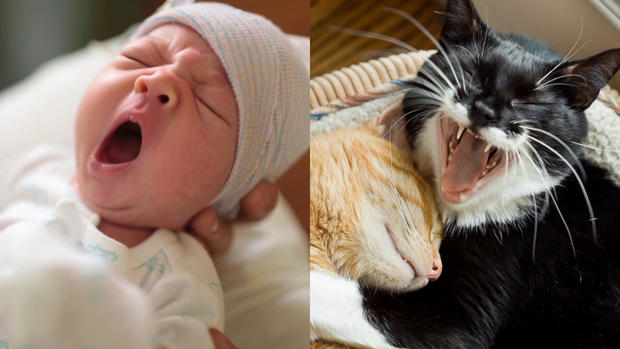Why we yawn
The biggest mystery this morning wasn't the time change, but what happened after you woke up.
The question of why we yawn is what drives professor Andrew Gallup, of the State University of New York's Polytechnic Institute, to get out of bed every day. Yawning, he says, is "something that people do every single day, multiple times a day, and they'll do it for their entire life. It's a far more complex behavior than meets the eye."
It's a behavior that begins before birth; doctors have even observed babies yawning in utero.
Correspondent Faith Salie asked, "Is it fair to say, to yawn is to be human?"
"To yawn is to be a vertebrate," Gallup replied. "Birds yawn. Other mammals yawn. Yawn-like behaviors are observed even in fish and reptiles and amphibians. So, it's a really ancient response."
We humans, it turns out, are superlative yawners. According to Gallup, "The average duration of yawning in humans is about six seconds. And we've actually studied the duration of yawning across different mammals, and we've found that humans are the longest yawners."
Why? "Well, we've shown that yawn duration is robustly correlated with brain size and cortical neuron numbers," he said.
So, maybe our big brains need that six-second jaw-gaping, eye-watering inhalation to get some oxygen? "There's actually no support for that hypothesis," Gallup said. "Yawning does not function to increase oxygen in our blood."
Gallup's research has shown that what yawning does do is increase bloodflow to our brains, cooling them, like a radiator cools a car engine. It's your brain's way of actually increasing alertness.
Gallup said, "Why it's important to have a cool brain is because brains operate most efficiently at an optimal temperature."
Salie asked, "Should we be flattered, then, when someone yawns in our presence? Is that person really trying to focus on what we're saying?"
"Yeah. When people yawn in classrooms or in front of other people, it actually represents an attempt for them to maintain attention and focus. And it indicates that they're actually paying attention to you."
So, it's fair to say the professor at Cornell University who castigated his students ("If I hear one more of these overly-loud yawns, GET UP AND WALK THE HELL OUT! YAWN OUTSIDE!") got the wrong message.
Gallup said, "Yawning is common among individuals right before public speaking events. Yawning has been documented among paratroopers right before they jump out of planes. And yawning is also very common among Olympic athletes right before competition. And it's not because they're sleepy. It seems that yawning is a response that helps prepare individuals for action."
Still, misperceptions about yawning persist. In fact, in 2009 one judge actually sentenced someone to jail for "disrupting" the court by yawning.
All of which to say, we won't fault you if you've yawned your way through this very story. Yawning IS highly contagious. Professor Matthew Campbell, of California State University Channel Islands, said, "You can think about wild animals needing to be alert and watching for predators. And so, if you're getting drowsy, but it's not time to rest, catching a yawn of someone else might make you more alert and therefore, 'Okay, I'm not gonna fall asleep. I'm gonna be in tune with the group.'"
According to Campbell, contagious yawning is actually one way animals, including us humans, show empathy towards each other: "We think that empathy is about adopting the feelings of others, so you get kind of on the same page as them. You're happy if they're happy. You're sad if they're sad. That allows you to bond and respond appropriately to individuals."
So, a contagious yawn is not only something we share with creatures large and small. It's a way we relate to one another.
"You're seeing that emotional connection, that body connection, that is involuntary and appears to be pretty deep in our evolution," said Campbell.
"When you frame it that way, they are this dramatic manifestation of our connection with each other," Salie said.
"You see a yawn caught by another individual, you catch someone else's yawn, and it says something about the positive aspect of their relationship," said Campbell. "And yeah, I think there's something beautiful there."
For more info:
- Professor Andrew Gallup, SUNY Polytechnic Institute, Utica, N.Y.
- Professor Matthew Campbell, California State University Channel Islands, Camarillo, Calif.
Story produced by Anthony Laudato. Editor: George Pozderec.








